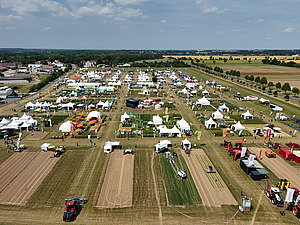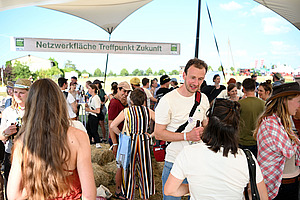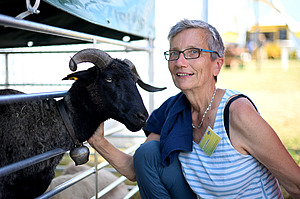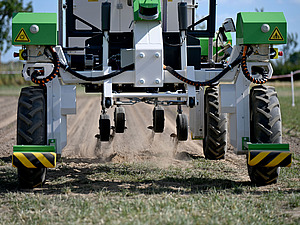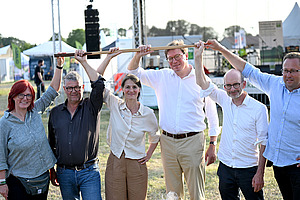Youth organisations from organic associations, organic women network and stakeholders from social agriculture met in the Future Network Area. Photo: Marzena Seidel, FiBL
The number of autonomous machines in agriculture is increasing. At the 2025 Öko-Feldtage, there were demonstration areas for the first time that were in use all day long. Photo: Marzena Seidel, FiBL
Agriculture Minister Georg-Ludwig von Breitenbuch (3rd from right) from Saxony hands over the baton to his colleague Miriam Staudte (4th from right) from Lower Saxony, where the Öko-Feldtage 2027 will take place. Also present: Vera Bruder, FiBL (left), Ralf Weber, Bauckhof Amelinghausen, (2nd from left), Peter Röhrig, BÖLW (2nd from right) and Dr Bernhard Wagner, Wassergut Canitz (right). Photo: Marzena Seidel, FiBL
The nationwide Öko-Feldtage (Organic Field Days) are a two-day meeting place for all organic farmers and all farmers who want to convert or are looking for new methods for environmentally friendly agriculture. The event offers stakeholders from across the industry an ideal platform to discuss current issues with farmers and representatives from politics and business. The innovation show highlights the current state of organic farming and its future development.
Visitors can learn all about the latest developments in agricultural technology, crop production, animal husbandry and research. Companies, associations and organisations present seeds, varieties, agricultural technology, operating resources, animal feed, stable construction, consulting services and much more. Between 9,000 and 12,000 visitors, depending on the federal state, came to see the range of services offered by organic farming, with almost a third of the farmers coming from the conventional farming sector.
A key difference to 'traditional' field days is that animal husbandry plays a central role, as livestock and circular economy are important components of organic farming. The focus is on the entire organic farming system in all its diversity, with innovative operating concepts, cultivation systems and modern animal husbandry.
The programme of the Öko-Feldtage combines practical and research aspects to showcase all the latest developments in organic farming. Visitors can get an impression of the latest agricultural technology in numerous machine demonstrations of hoes, harrows, rakes, GPS- and camera-guided machines, for example. Many examples of innovation showcase prototypes and new developments. The latest findings on challenges such as the climate crisis, organic breeding and animal welfare will be addressed in guided tours and forums and discussed by scientists and practitioners. On numerous demonstration plots, companies, breeders, consultants and universities will also present new cereal and legume varieties, crop rotations, catch crops and inputs for organic farming. Delicious organic food from regional suppliers, music and dancing complete the programme.
The 2017 and 2019 Öko-Feldtage took place at the Hessian State Domain Frankenhausen, the teaching and research farm of the University of Kassel, in Grebenstein. The third Öko-Feldtage moved to the Hessian State Domain Gladbacherhof, the teaching and research farm of the University of Giessen in Villmar, in 2022. In 2023, the Öko-Feldtage took place for the first time in Baden-Württemberg and for the first time on a private farm, the Grieshaber & Schmid organic farm in Ditzingen-Hirschlanden. The Wassergut Canitz, a farm owned by the Leipzig waterworks, was the venue for the 2025 Öko-Feldtage. Over 360 exhibitors presented their innovations there at their booths, during machine demonstrations or on the demo plots. FiBL Projekte GmbH is currently preparing the next Öko-Feldtage, which will be held on 16 and 17 June 2027 at the Bauckhof Amelinghausen in the district of Lüneburg: for the first time in Lower Saxony. Interested parties can find more information about the Öko-Feldtage at www.oeko-feldtage.de.




